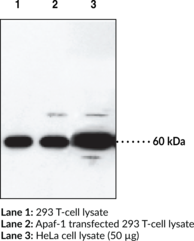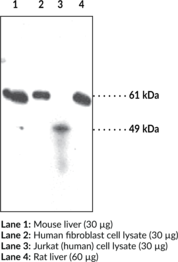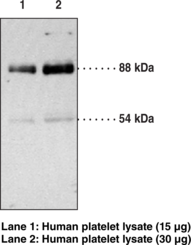Description
Apoptosis is related to many diseases and is induced by a family of cell death receptors and their ligands. Cell death signals are transduced by death domain containing adapter molecules and members of the caspase family of proteases. The mammalian homologues of the key cell death gene CED-4 in C. elegans has been identified recently from human and mouse and designated Apaf-1 (apoptosis protease-activating factor 1){6894,6873} Apaf-1 binds to cytochrome c (Apaf-2) and caspase-9 (Apaf-3), which leads to caspase-9 activation. Activated caspase-9 in turn cleaves and activates caspase-3, one of the key proteases responsible for the proteolytic cleavage of many key proteins in apoptosis.{6874} Apaf-1 can also associate with caspase-4 and caspase-8.{6878} Apaf-1 is ubiquitously expressed in human tissues.{6894}
Synonyms: Apoptosis Protease-Activating Factor 1
Immunogen: Synthetic peptide from an N-terminal region of human Apaf-1
Formulation: 200 µl of peptide affinity-purified polyclonal antibody
Isotype:
Applications: WB
Origin: Animal/Rabbit
Stability: 365 days
Application|Western Blot||Product Type|Antibodies|Polyclonal Antibodies||Research Area|Cell Biology|Cell Death|Apoptosis||Research Area|Cell Biology|Cell Death|Pyroptosis||Research Area|Cell Biology|Proteolysis



